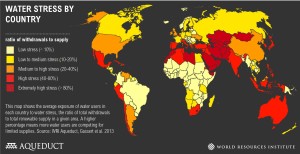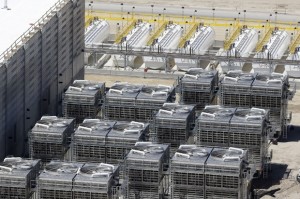
Sepp Hasslberger: Water Vortex Generator [Video]
03 Economy, 05 Energy, 12 Water, Earth Intelligence
This is intriguing – an obviously historical construction meant to create a strong vortex in flowing water drawn from a river – which reminds very much of a small vortex hydro power plant constructed some years ago by an Austrian engineer, which I reported on at the time…
Kurt Van Wijck at the Green School in Bali presents to Ken Morgan of Venger Wind the Water Vortex Generator that will soon provide clean and fish safe hydro power to the school. For more information please contact Kurt at tailoredcom@bigpond.com
Berto Jongman: Campaign to Legislate End of Water for NSA in Utah…Going National
12 Water, Idiocy, MilitarySome NSA Opponents Want to ‘Nullify' Surveillance With State Law
Activists say legislation can cut water, kill snooping at Utah Data Center
The National Security Agency has an Achilles heel, according to some anti-surveillance activists. The key vulnerability, according to members of the OffNow coalition of advocacy groups: The electronic spy agency's reliance on local utilities.

The activists would like to turn off the water to the NSA's $1.5 billion Utah Data Center in Bluffdale, Utah, and at other facilities around the country.
Dusting off the concept of “nullification,” which historically referred to state attempts to block federal law, the coalition plans to push state laws to prohibit local authorities from cooperating with the NSA.
Draft state-level legislation called the Fourth Amendment Protection Act would – in theory – forbid local governments from providing services to federal agencies that collect electronic data from Americans without a personalized warrant.
Continue reading “Berto Jongman: Campaign to Legislate End of Water for NSA in Utah…Going National”
John Maguire: Interview on Exotic Vacuum Technologies
03 Economy, 05 Energy, 06 Family, 07 Health, 09 Justice, 11 Society, 12 Water, Earth Intelligence
Interview with Moray B. King. Moray has been working as an Electrical and Systems Engineer for over 30 years. During that time, in parallel, he has done extensive independent research into the standard physics literature concerning both the Zero Point Field and Self-Organizing Systems. He has also conducted extensive research into the patents and experiments of inventors who have reported anomalous energy gains over the decades. He is considered one of the leading authorities on the subject of Zero Point Energy, and has written two books on the topic titled: Tapping the Zero Point Energy, and Quest for Zero Point Energy. Most recently Moray gave a presentation titled “Water, Plasmoids, and Zero Point Energy” at this year’s Breakthrough Energy Movement Conference. A detailed outline can be found @ WordPress.
https://www.youtube.com/watch?
Continue reading “John Maguire: Interview on Exotic Vacuum Technologies”
Eagle: Beyond Downsizing — Small Homes That Harvest Rain and Generate Power
03 Economy, 05 Energy, 06 Family, 07 Health, 11 Society, 12 Water
Beyond Downsizing. How Baby Boomers Can Avoid a Failed Retirement
Here’s a little bit of a twist on some conventional analysis.
Let’s start with a trend. The baby boomers are getting older. Their kids have departed (most of them). It’s time to downshift towards prepare for 20-30 years of “active retirement.”
How? They need to get their ravaged finances in order, by cashing out of their biggest investment, their home. And since this trend will be both huge and will occur very quickly, it’s going to have profound effects on the US housing market. Specifically, three things:
- The market for bigger homes will decline sharply. It’s important to not be the last one out before the prices soften or crump.
- The market for smaller homes for couples will improve markedly (there aren’t nearly enough homes in the current housing stock to support this shift). Most of these will be in suburbs (boomers aren’t going back to the city).
- Many of these new purchases will be to nearby communities that are less expensive (reversing the trend that drove up prices in towns with great school systems — putting even more pressure on #1 above).
Continue reading “Eagle: Beyond Downsizing — Small Homes That Harvest Rain and Generate Power”
SchwartzReport: All Dried Up – China Water Crisis
02 China, 12 Water![]() All Dried Up
All Dried Up
The Economist (U.K.)
Water is destiny. And here, once again, is evidence of this. China's water and, thus, food problems hold tremendous implications for not just China but the world.
BEIJING — CHINA endures choking smog, mass destruction of habitats and food poisoned with heavy metals. But ask an environmentalist what is the country’s biggest problem, and the answer is always the same. ‘Water is the worst,” says Wang Tao, of the Carnegie-Tsinghua Centre in Beijing, ‘because of its scarcity, and because of its pollution.” ‘Water,” agrees Pan Jiahua, of the Chinese Academy of Social Sciences. ‘People can’t survive in a desert.” Wang Shucheng, a former water minister, once said: ‘To fight for every drop of water or die: that is the challenge facing China.”
He was not exaggerating. A stock image of China is a fisherman and his cormorant on a placid lake. The reality is different. The country uses 600 billion cubic metres (21,200 billion cubic feet) of water a year, or about 400 cubic metres a person-one-quarter of what the average American uses and less than half the international definition of water stress.
Continue reading “SchwartzReport: All Dried Up – China Water Crisis”
NATO ACT CFC: Water Security: Afghanistan Transboundary Water Resources in Regional Context
08 Wild Cards, 12 Water Water Security: Afghanistan Transboundary Water Resources in Regional Context
Water Security: Afghanistan Transboundary Water Resources in Regional Context
NATO Allied Command Operations (ACO) Civil-Military Fusion Centre (CFC)
Rainer Gonzalez Palau
Afghanistan Team Leader
Social and Strategic Infrastructure Desk Officer
This document outlines the global trends in water security and the threats to regional stability posed by the transboundary water resources. Moreover, the document presents salient details in the particular case of Afghanistan's transboundary water resources, reviews disputes over the four main international basins Afghanistan shares with its neighbouring countries, and introduces a framework to properly manage water resources. Further information on these issues is available at www.cimicweb.org. Hyperlinks to source material are highlighted in blue and underlined in the text.
Within the next twenty years, the global demand for water will exceed expected supply by forty per cent, according to a report by McKinsey & Company. Since “water security is the gossamer that links together the web of food, energy, climate, economic growth, and human security challenges,” a shortage of water will escalate food prices, disrupt energy availability, limit trade, increase refugee flows and undermine authority, says the World Economic Forum (WEF). If the worsening water security structural problem is unheeded, it will inevitably tear into various parts the global economic system. Illustratively, water was at the heart of the agricultural challenges that caused the unprecedented volatility in food prices between 2007 and 2010. As economies grow and societies develop more water is needed to match the accelerating demand for food and obtain energy to supply the rapidly increasing urban and industrial systems. At the same time rainfall and weather patterns shift and rivers and groundwater sources are becoming more polluted.
This report is divided into four sections: (i) global trends in water security issues and how these can affect global stability in the future; (ii) drivers of transboundary water management conflicts in Central and South Asia; (iii) overview of the four critical international basins that Afghanistan shares with neighbouring countries; and (iv) recommendations by experts for improving water management and avoiding conflict over transboundary water resources.
PDF (15 Pages): 201310_CFC_Afghanistan_Transboundary_Resources_final

